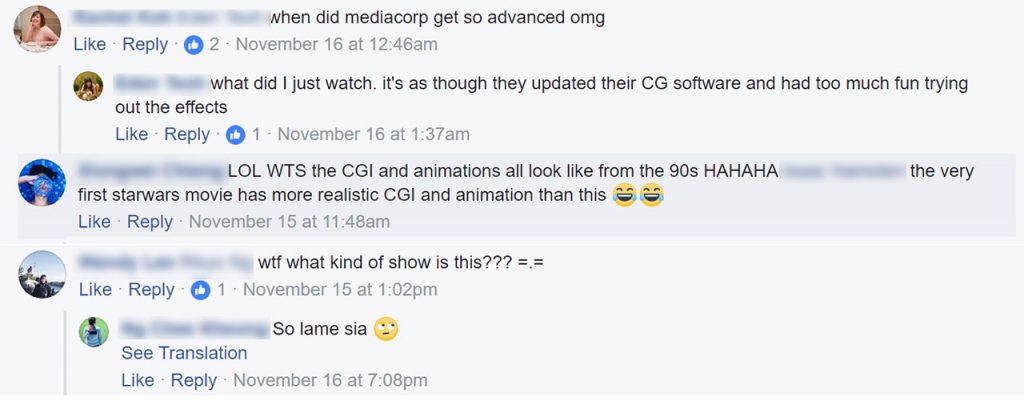No, I’m not kidding – it’s a show about aliens in Singapore.
While the premise is outlandish, MFFA cleverly marries it with a more down-to-earth plot of the aliens (led by Feng Jiao, played by Carrie Wong) interacting with heartlander Singaporeans (led by Yang Tian Sheng, played by Shaun Chen).
The show mines much humour from these interactions, especially since the aliens are much more biologically advanced than humans (they can fly, communicate by telepathy and read thoughts).

Later in the episode, as the aliens snap their flat’s blinds shut to avoid a neighbour’s curious gaze, the neighbour says: “怕人家看,住condo啦!” (“If you don’t want people to look in, go live in a condominium!”)
The show also gleefully uses its fish-out-of-water concept to poke fun at Singaporean society’s quirks. For example, the aliens wonder why Singaporeans would “chope” seats at a food court before ordering food when it would not take up more time to simply buy food and subsequently look for a seat. In another episode, the aliens rush to put out an open fire near their block, only to be admonished by the aunties who were actually burning joss paper in the fire.
I could go on and on with more examples, but I’ll settle for an analogy: Like a particle accelerator, MFFA smashes disparate ingredients together in the hope of unearthing something wonderful. It’s a successful experiment – MFFA takes a gamble on its premise and the result is a delight to watch.


Let’s take a closer look at more comments.

Think The Unbeatables (双天至尊), the iconic gambling drama with Li Nanxing and Zoe Tay; the historical war drama The Price of Peace (和平的代价); the wuxia adaption The Legendary Swordsman (笑傲江湖); and the period drama Stepping Out (出路).
However, in the past decade, the general perception has been that MediaCorp’s contemporary Chinese dramas have declined in quality. What’s more, public sentiments has been turning against shows in the family drama genre such as the long-running 118 and its sequel 118 2, which used to be mainstay home entertainment.

If anything, we should be criticising MediaCorp’s inability to create a truly engaging family drama in recent years, rather than taking down the entire genre.
Then again, MFFA is not your typical contemporary family drama. In that case, how do we explain these mocking remarks?

This tendency to put down Singaporean television at first glance is not just about the quality of our shows, but also the other facets of our television industry. Take MediaCorp’s annual Star Awards show, which has been criticised for being self-congratulatory – after all, who in the television industry would have the cheek to reward themselves every year for a job well done?
The answer: everybody, from Hollywood to Hong Kong.
In Hong Kong, TVB organises the TVB Anniversary Awards to honour the best in TVB programming for the year. Even in Hollywood, the annual Emmy awards are decided by voters from the Television Academy, who happen to be people working in the US television industry.
Yet, our local viewers conveniently ignore this and happily slam MediaCorp for being “ownself reward ownself”.
Best (or worst) of all, local viewers are prone to make absurd complaints like these:

And that’s not even counting those who simply go onto the Internet to illegally download them or buy an illegal setup box to stream these shows.
In fact, our exposure to foreign television content is so widespread that every time local television content is discussed, someone would inevitably say that compared to foreign productions, local television is terrible.
Unfortunately, people who think that way are misguided. Foreign television can be horrible too – it’s just that we do not know about the bad shows out there. For every success like Orange is the New Black, there have been 100 television dramas aired in the US that are absolutely terrible. Remember the travesty that is Temptation Island?
Friends may be a classic in the sitcom genre, but we do not hear about the other 99 per cent of sitcoms that are forgettable at best and unwatchable at worst.
We Singaporean viewers are a lucky lot – we hear only about the best television series out there and can watch them with great ease. With our inflated expectations, it is inevitable that we find local television lacking.
And if local viewers were already inclined to sneer at our local productions, our exposure to international content provides the background for a classic put-down – that MediaCorp had “copied” a concept from somewhere else:

Similarly, the Netflix hit House of Cards and HBO’s Emmy-winning comedy Veep were both based on British television shows and remade for an audience more in tune with American flavour.
Furthermore, though Game of Thrones is adapted from the popular A Song of Ice and Fire fantasy novel series, the show has risen above the books and become arguably the most popular television show in the world.
To dismiss a television show simply because it was inspired by an earlier show is simply ridiculous and superficial. If we are comfortable with foreign shows doing exactly that, we should not be hypocritical when it comes to local shows.
And it’s a problem only we can fix – not MediaCorp, nor the aliens from MFFA even.






